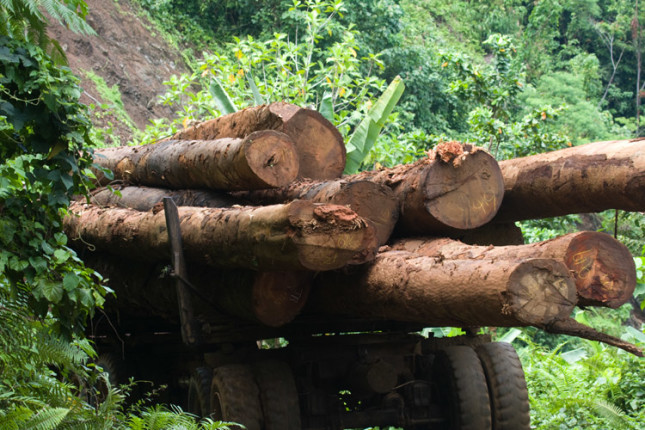-
China’s Demand for Raw Materials Harms Communities Around the World
January 23, 2019 By Truett Sparkman
The Solomon Islands’ “commercially available forests will be gone in about 15 years” due to deforestation, said Lela Stanley, a Policy Advisor for Global Witness’ Asia Forests team at the Wilson Center’s recent China Environment Forum event. It looks like they are logging about 20 times faster than they should for the logging to be sustainable, she added. While timber from the islands is exported to China—the world’s largest importer and consumer of timber products—local residents and communities bear the brunt of the environmental cost of lost ecosystem services suffered at the hands of the timber trade. And they aren’t alone. China’s insatiable demand for raw materials and its harmful resource extraction practices wreak havoc on the ecosystems of its many producer countries.
Illegal Logging
One such supplier is among the world’s most biodiverse countries, Papua New Guinea. A recent addition to China’s Belt and Road Initiative, Papua New Guinea is suffering from irresponsible resource extraction practices driven by China’s demand for timber, Stanley said. In one example, people could no longer use a river for cooking, cleaning, and bathing because erosion and pollution from upstream logging operations had gotten so bad. About 85 percent of the country’s citizens are rural subsistence dwellers who depend on their land and forests to survive. Many are members of native communities that were constitutionally granted control over the land they live on, said Stanley. In theory, if you want to log in a forest, you have to get the approval of everyone who lives there. “But in practice,” said Stanley, “that never happens.”
Despite their constitutional protection, Stanley said, community forests are often leased to Malaysian and some Chinese-backed logging companies, without locals’ knowledge or consent—effectively stealing millions of dollars of timber. In one instance, a community only learned of the threat to their forest when “ships pulled up to their beach with logging equipment on them and started driving up the island,” said Stanley.
Weak Regulatory Capacity
A similar case of mismanagement and discrepancies between policy and practice exists in the bauxite mining sector of the West African country of Guinea, said Jim Wormington, Researcher for Human Rights Watch’s Africa Division. But in this instance, China has a much greater stake in the mineral ore on the table. Société Minière de Boké (SMB), Guinea’s primary mining company, which is a consortium of three companies from China, Singapore, and Guinea, exported 35 million tons of bauxite in 2018. Wormington said the company and the Guinean government were so focused on economic growth that the environmental and social impact assessments “weren’t done in a way that could possibly foresee or protect communities from,” the environmental impact of the mining industry. China’s two previous primary suppliers of bauxite, Indonesia and Malaysia, banned all exports of the ore to China for geopolitical and environmental reasons, respectively, said Wormington.
For Papua New Guinea and Guinea, the crux of the resource extraction issue is that both countries suffer from such weak regulatory capacity that they cannot adequately enforce their laws to protect both the local environment and communities, said Stanley and Wormington. This creates challenges when China’s domestic policy requires Chinese companies operating abroad to observe the laws of the countries where they are operating, but unfortunately “doesn’t actually address legality or sustainability issues,” said Stanley. As a result, irresponsibly harvested and illegally harvested natural resources remain in China’s supply chain.
Taking Advantage of Host Countries’ Weak Laws and Agencies
The stronger the regulatory institutions a country maintains, the more likely Chinese companies are to adhere to environmental and human rights law, said Jingjing Zhang, Lecturer in Law for the Environmental Law Program at University of Maryland. Despite a number of new central government documents requiring “greener” performance of Chinese investment overseas, Chinese companies are still able to take advantage of unclear and weak laws and regulatory agencies in host countries. Zhang speaks from experience, having brought lawsuits against Chinese companies violating environmental and human rights laws in Latin America and Africa. In July 2018, Zhang argued a case in front of the Supreme Court in Ecuador that helped the Kañari-Kichwa indigenous communities stop a Chinese company from mining in the Cajas Nature Reserve in Ecuador because the company failed to consult with local communities and get consent for the mining.
The three speakers unanimously agreed that China should place legally binding regulations on Chinese companies operating overseas regarding best practices for protecting vulnerable people and ecosystems in order to fulfill President Xi Jinping’s goal of greening China’s massive Belt and Road investments. This recommendation circumvents the difficult task of rapidly changing the regulatory landscapes in all of China’s developing country business partners. Instead, with lives and livelihoods on the line and with time running out for many of earth’s precious ecosystems, decisive, responsible leadership is needed, especially from developed countries with significant international influence, such as China.
Sources: The Economist, Intercontinental Cry
Photo Credit: Logging truck, Makira, Solomon Islands, April 2012, courtesy of Tony Morris.
 A Publication of the Stimson Center.
A Publication of the Stimson Center.



